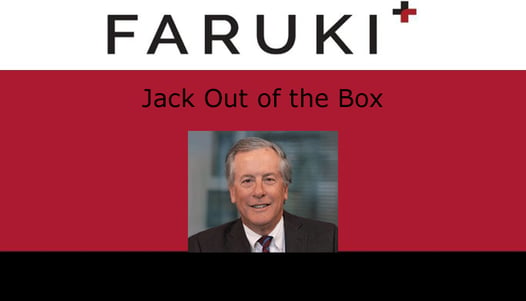- May 1, 2024
- Jack Greiner
- Jack Out of the Box
 I saw an interesting case out of New York that poses and interesting question – is "Pure Irish Butter" pure if it's wrapped in packaging containing forever chemicals? The New York Court decided there was enough of a claim to deny the Butter Company's motion to dismiss.
I saw an interesting case out of New York that poses and interesting question – is "Pure Irish Butter" pure if it's wrapped in packaging containing forever chemicals? The New York Court decided there was enough of a claim to deny the Butter Company's motion to dismiss.
In early 2023, Ornua Foods North America Inc., issued a recall of its Kerrygold Butter products. The recall was prompted by a New York state law banning per- and polyfluoralkyl substances (PFAS) in food packaging. Ornua issued the recall of the Kerrygold Butter Products because the packaging contained PFAS. Exposure to PFAS — a category of synthetic, artificial chemicals often called "forever chemicals" — is linked to fertility issues, developmental delays, increased risk of cancer, increased cholesterol and obesity, and reduced immune response and can be dangerous even at low levels.
As a result of the recall, a woman named Carolyn Winans brought a lawsuit on behalf and a class of consumers contending that Ornua had engaged in deceptive advertising and product mislabeling. Her complaint seeks money damages and injunctive relief.
According to the lawsuit, the PFAS in the packaging migrated into the butter. Ms. Winans, who purchased and consumed the product, contends that labeling the product as "Pure Irish Butter" is deceptive. The P in PFAS doesn't stand for "Pure." And the presence of forever chemicals isn't exactly purity.
Ornua moved to dismiss the complaint on numerous grounds. It first argued that Ms. Winans lacked standing to proceed with the suit, because she failed to plausibly allege the butter contained PFAS. But the court concluded that Ms. Winans established standing by citing several studies establishing other instances of PFAS migrating from packaging to food products. This satisfied the "plausibility" standard.
Ornua also moved to dismiss on the ground that its packaging didn't deceive Ms. Winans. According to this argument, "the phrase 'pure Irish butter' on the Kerrygold packaging is not misleading because the word 'pure' modifies 'Irish,' not 'butter,' i.e., 'pure' is a claim about Kerrygold's single-source, Irish origin rather than about the quality of the butter. Stated differently, Ornua urges the Court to read the phase 'pure Irish butter' as meaning 'butter purely from Ireland,' rather than 'pure butter from Ireland.' The implication is that, even if the Products contained PFAS, they would not mislead consumers because the packaging does not purport that the products are pure, i.e., without PFAS."
There is an old saying in the law that if you're explaining, you're losing. And Ornua was doing a lot of explaining with that argument. The Court was unimpressed. In its view, "[a]ssuming the butter contains PFAS, the Court concludes that a reasonable consumer could be misled by the 'Pure Irish butter' label. It is plausible that a reasonable consumer reading the label would conclude that the adjective 'pure' modifies the noun, 'butter.' . . . In fact, 'pure' is a common product label, and other courts have concluded that a reasonable consumer viewing the product would interpret the terms to mean that the product is free of other substances."
In denying the motion to dismiss, the Court simply allowed the case to proceed to discovery. There is a long way to go before Oruna is found liable. But it's an interesting view into how a court handles a mislabeling claim.
